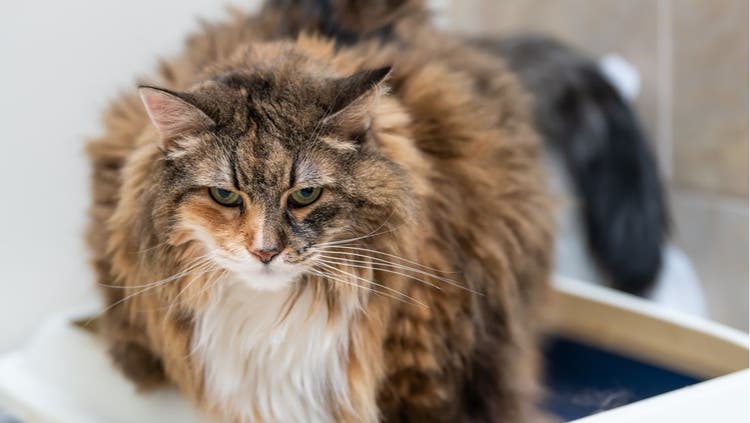
What to Do if Your Cat Has a Urinary Tract Infection
Some of the most common cat health problems are diseases that affect the urinary tract. They can include cat urinary tract infections, feline idiopathic cystitis, bladder stones, inappropriate urinations, urinary obstructions, acute kidney failure, and chronic kidney failure. We will review these common diseases and help you understand what you can do if you believe your cat has a urinary tract infection.
Common Feline Urinary Tract Problems
Cats can acquire several different diseases of the urinary tract that can all have similar symptoms. Some problems are life-threatening and others are not, which makes it critical to obtain the proper diagnosis.
Common problems of the cat urinary system include:
- Urinary Tract Infection – Urinary tract infections, also known as cystitis, can occur in cats. Symptoms often include frequent trips to the litter box and/or excessive grooming of the genital area. Based on research, most causes of cystitis in cats are not from infection, but more often due to feline idiopathic cystitis (FIC), which means it has no known cause. Senior cats may also have a urinary tract infection due to bacteria.
- Feline Idiopathic Cystitis (FIC) – This is one of the most common cat health problems, estimated to affect more than 1% of all cats. FIC, also known as “feline lower urinary tract disease (FLUTD)”, “feline urologic syndrome (FUS)”, and “painful bladder syndrome (PBS),” results in inflammation of the lower urinary tract. The cause is unknown, but factors that may play a role include stress, diet (dry food diets with high mineral content), strict confinement, genetic factors (long-haired cats seem to be more affected), and viruses. Accumulated inflammatory debris and crystals can aggregate and form a plug causing an obstruction in the urethra. This is most common in male cats and is a life-threatening medical emergency.
- Feline Urinary Obstruction – A feline urinary obstruction, commonly referred to as a “blocked cat,” is a life-threatening emergency most prevalent in male cats. Untreated, most cats will die in 72 hours. The blockage can be caused by stones, but usually, the cause is a plug of inflammatory debris and crystals, which is part of the common syndrome called feline idiopathic cystitis (FIC).
- Bladder stones, also known as urolithiasis, refers to the formation of stones in the urinary tract. Stones, also known as calculi, can be found anywhere in the urinary tract, in the kidneys, the ureter or the bladder, but are most common in the bladder. They develop due to oversaturation of the urine with certain minerals, alterations in the pH, and highly concentrated urine.
- Tumors of the bladder, such as transitional cell carcinoma, are malignant cancer usually arising from the inside surface of the urinary bladder or urethra. The cause is unknown. This can cause recurrent urinary tract infections, blood in the urine, straining to urinate, and frequent urination.
- Inappropriate urination is by far the most common behavioral cat health problem and can be extremely frustrating to pet parents. In addition to behavioral causes, inappropriate urination in cats can be caused by feline idiopathic cystitis (see above), bladder stones, or infections.
- Chronic Kidney Disease is the gradual loss of kidney function and one of the most common diseases in senior cats.
- Acute kidney disease is the sudden loss of kidney function and can be caused by toxins like antifreeze.
What Is a Cat Urinary Tract Infection
A urinary tract infection is an infection somewhere in the urinary tract. The urinary tract consists of the kidneys, ureters, bladder, and urethra. Most commonly, the urinary tract infection is in the bladder, but can also be in the kidneys (called pyelonephritis).
Symptoms of a Cat Urinary Tract Infection
Symptoms of a cat urinary tract infection can be similar to those of other urinary tract problems. They can include:
- Crying out and vocalization during urination
- Difficulty urinating
- Frequent urination
- Bloody urine
- Urinating in inappropriate locations
- Blockage of urine flow (as well as a blockage in the urethra)
- Licking the genital area
- Strong urine odor
- Lethargy
- Vomiting
- Decreased appetite
- Hiding
It is critical to see your veterinarian if your cat is showing the above symptoms. It can be difficult to determine the difference between a cat with an empty bladder and cat that is in pain with a full bladder and a blockage.
What to Do if You Suspect Your Cat Has a Urinary Tract Infection
If your cat is showing symptoms of frequent, difficult, or inappropriate urination, the best thing to do is to see your veterinarian. When you go to your vet, you can likely expect the following:
- Your veterinarian will obtain a complete medical history and perform a thorough physical examination including palpation of the abdomen to evaluate the bladder size.
- The following tests can help determine the cause of the symptoms:
- Urinalysis is an evaluation of the urine that can determine the absence or presence of white blood cells, red blood cells, crystals, and/or bacteria. This can diagnose a cat urinary tract infection.
- Bacterial culture and sensitivity of the urine are performed to identify the offending organism if bacterial cystitis is suspected. A fresh urine sample is obtained using a sterile technique. A culture and sensitivity are commonly recommended after repeat infections.
- Radiographs (X-rays) can be used to identify stones.
- Ultrasound can help evaluate the bladder for stones, crystals, or tumors.
Treatment of a Cat Urinary Tract Infection
A urinary tract infection is commonly treated with a course of antibiotics, such as penicillin or amoxicillin, as well as pain medications. Results of sensitivity testing can be used to choose the appropriate antibiotic.
Diagnostic tests are important to evaluate for underlying causes of the urinary symptoms in cats with recurrent episodes of bacterial urinary tract infections.